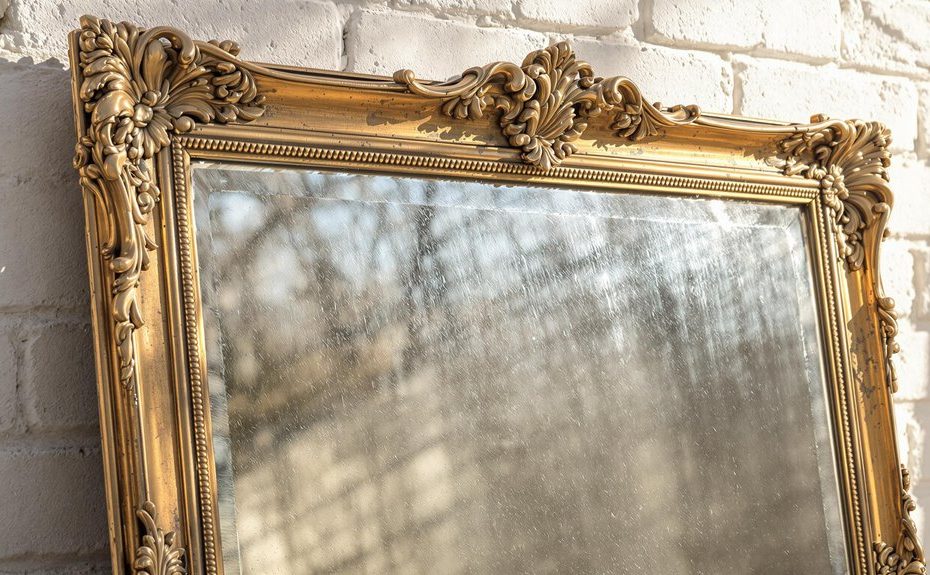Want to give your mirror frame an antique makeover? You've got plenty of creative options! Try applying gold leaf for instant luxury, or create a weathered wood look using vinegar and steel wool. Metallic paint distressing offers an elegant aged appearance, while a crackle finish adds authentic vintage charm. For unique character, incorporate salvaged architectural elements like old moldings or medallions. You can also experiment with aged bronze patina, Victorian details, rustic barn wood, or a striking copper verdigris effect. These simple techniques can transform any plain frame into a stunning conversation piece. Let's explore each method to find your perfect DIY project.
Classic Gold Leaf Application
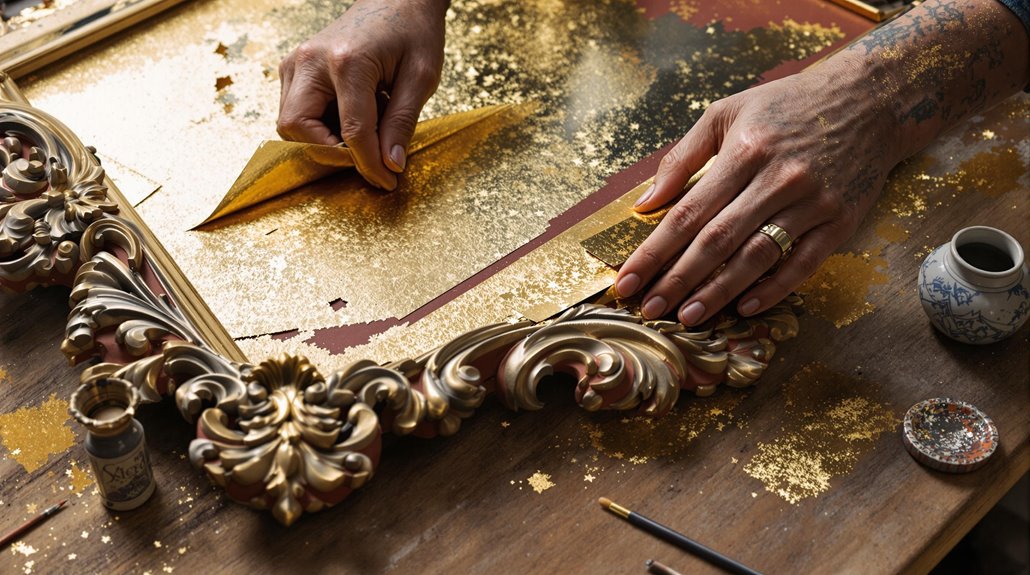
When applying gold leaf to an antique mirror frame, proper preparation is essential for achieving a luxurious, timeless finish. Start by cleaning your frame thoroughly and sanding any rough spots. Apply a sealer and let it dry completely. Using basic gold leaf techniques, carefully lay the delicate sheets onto your adhesive-coated frame. You'll love how these antique frame preparation steps transform your piece into a stunning masterpiece.
Weathered Wood Frame Design
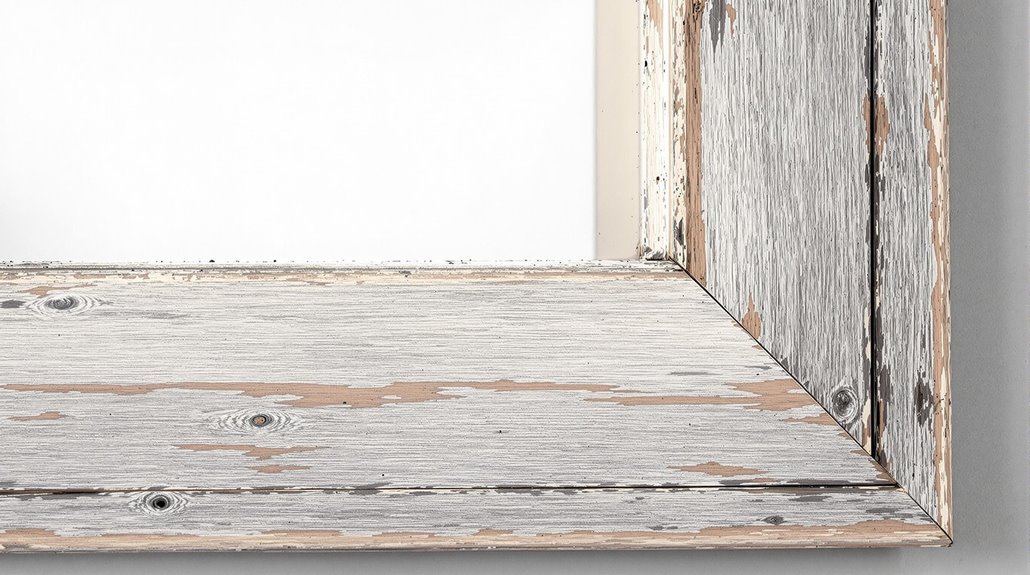
Nature's timeworn beauty shines through in a weathered wood frame design, offering rustic charm to any antique mirror. To create this look, sand down a basic wooden frame and apply a mix of white vinegar and steel wool solution. Let it sit overnight, then brush it on. The wood will naturally darken and develop that sought-after weathered appearance.
Metallic Paint Distressing
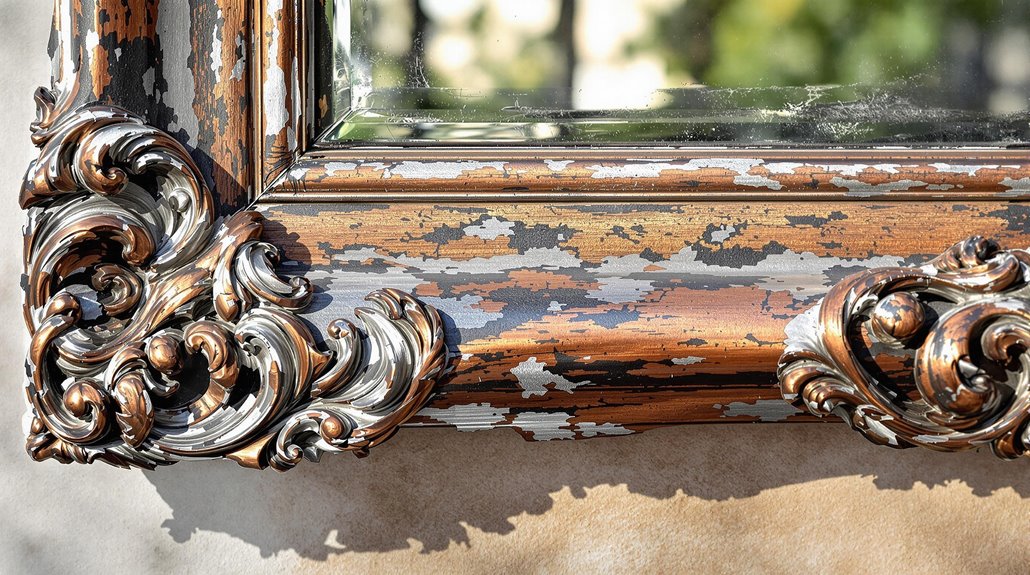
Three classic metallic paint techniques can transform an ordinary mirror frame into an elegant antique masterpiece. You'll love how easy it is to achieve that perfect metallic sheen using silver, gold, or bronze paint. Start by applying your base coat, then gently sand specific areas to create a distressed texture. Finally, add a dark glaze in the corners for that timeworn appeal.
Vintage Crackle Finish
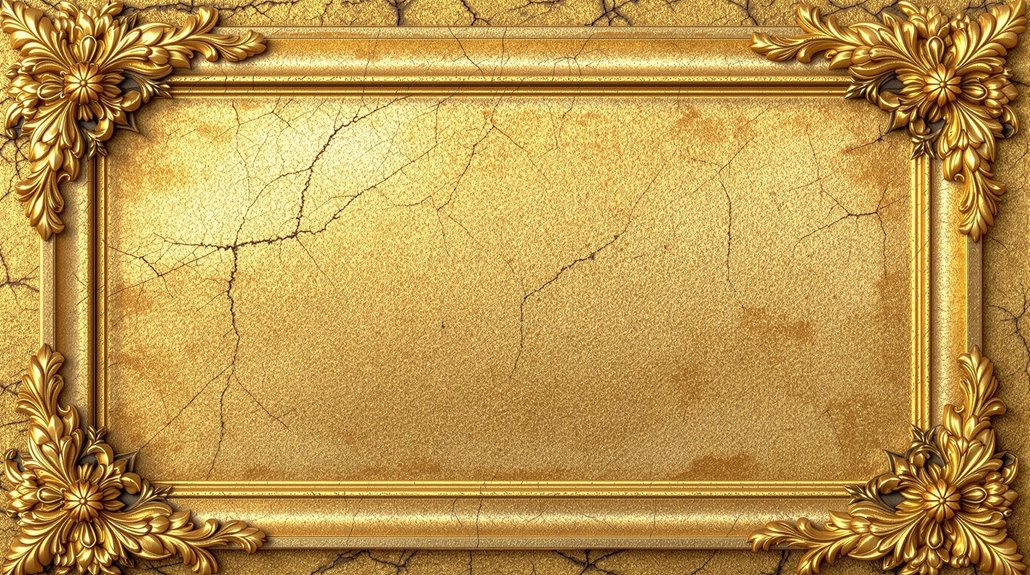
Creating a vintage crackle finish adds authentic age-worn character to mirror frames through intentional surface cracks and breaks. You'll love how this crackle technique transforms ordinary frames into stunning vintage pieces. Simply apply a special crackle medium between paint layers, and watch as the surface naturally splits and separates, creating that coveted vintage aesthetic you're looking for.
Salvaged Architecture Elements
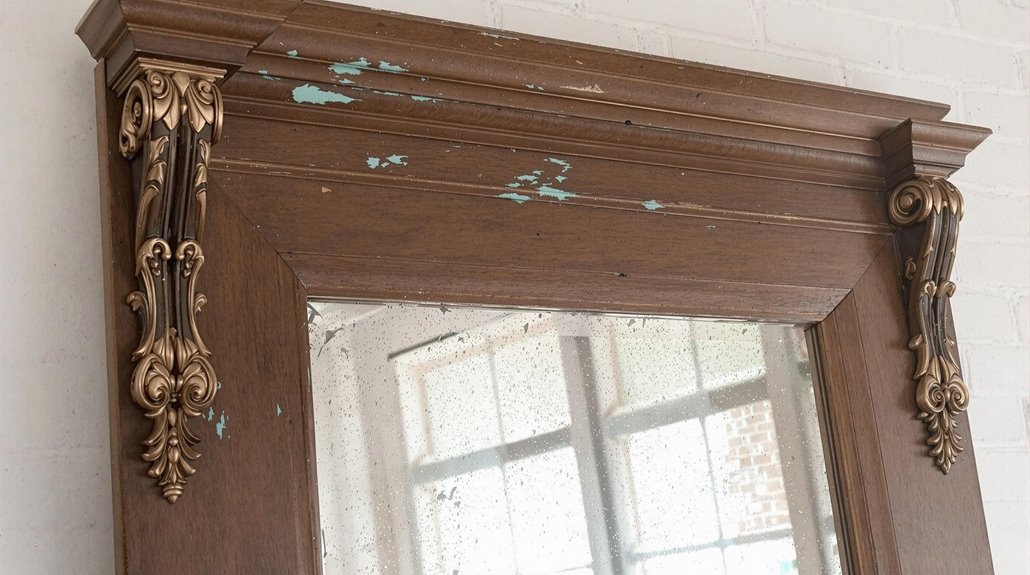
While crackle finishes bring vintage charm through paint techniques, incorporating salvaged architectural elements takes antique mirror frames to a new level of authenticity. You can transform your mirror frame by adding pieces of salvaged wood from old barns or Victorian homes. Look for interesting architectural fragments like decorative corbels, moldings, or medallions to create a one-of-a-kind frame that tells a story.
French Country Chalk Paint
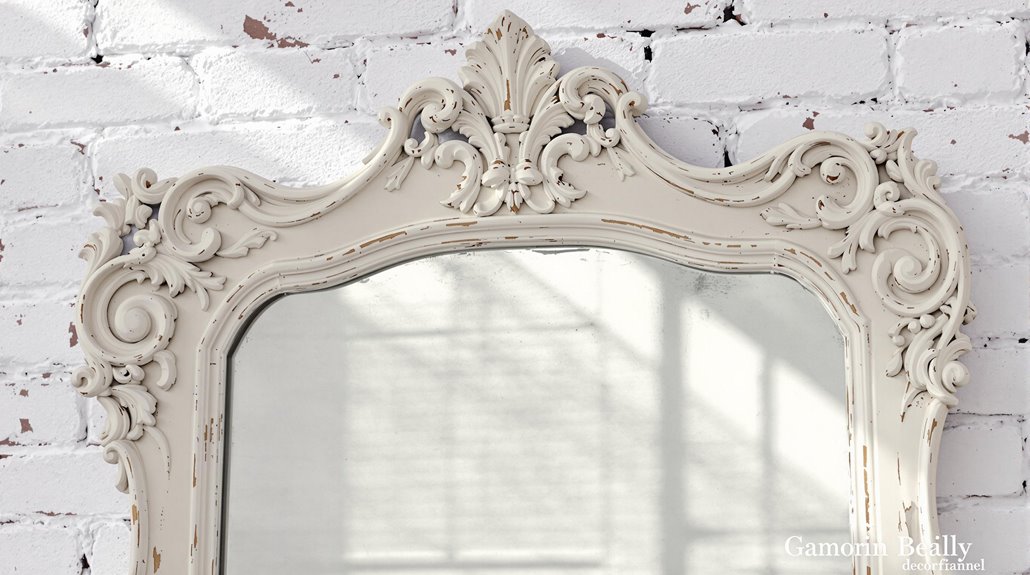
French Country chalk paint offers a timeless elegance that beautifully complements antique mirror frames. You'll love how this paint style creates that perfect worn, vintage look with minimal effort. Simply apply two coats of French country-inspired colors like soft grey, cream, or dusty blue, then gently sand the edges. For extra character, try layering different chalk paint shades to achieve authentic French country charm.
Aged Bronze Patina Effect
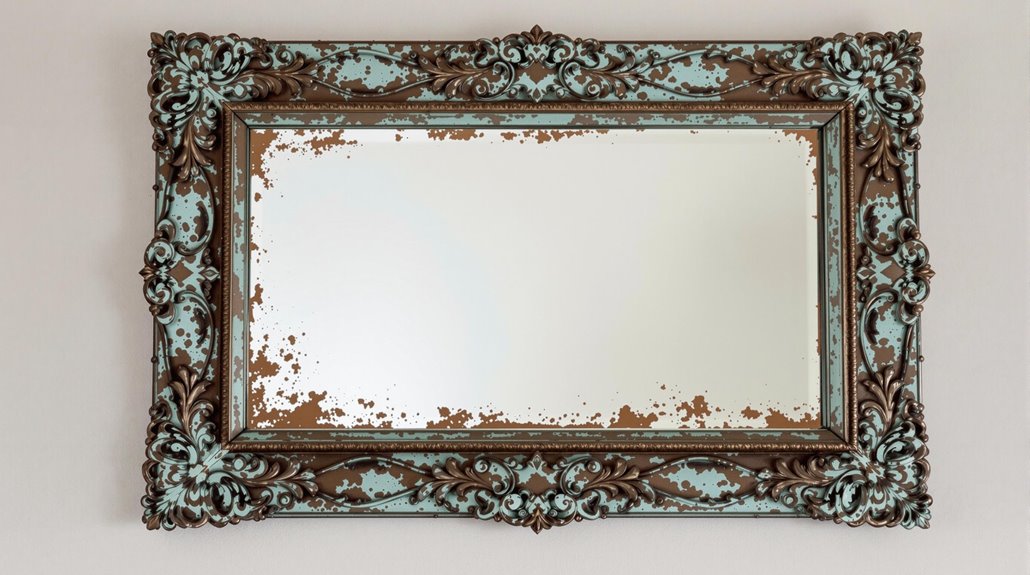
The timeless beauty of aged bronze patina can transform an ordinary mirror frame into a striking focal point. Using simple bronze aging solutions and patina techniques, you can create stunning verdigris effects that mimic centuries-old finishes. Start by cleaning your frame, then apply a bronze metallic base coat. Once dry, spray or brush on patina solution, letting the beautiful blue-green tones develop naturally.
Victorian Ornate Detailing
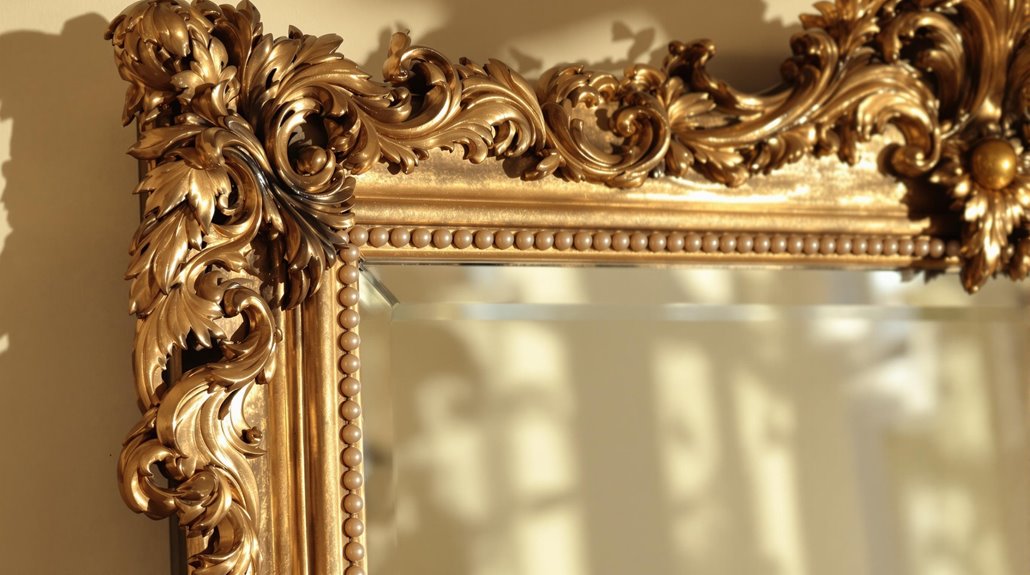
Ornate Victorian-era details can elevate a simple mirror frame into an elegant masterpiece reminiscent of 19th-century craftsmanship. You can add Victorian motifs like scrollwork, floral patterns, and acanthus leaves using decorative molding or polymer clay. For authentic ornate embellishments, try attaching carved wooden appliques to your frame's corners and edges, then paint them to match your desired finish.
Rustic Barn Wood Frame
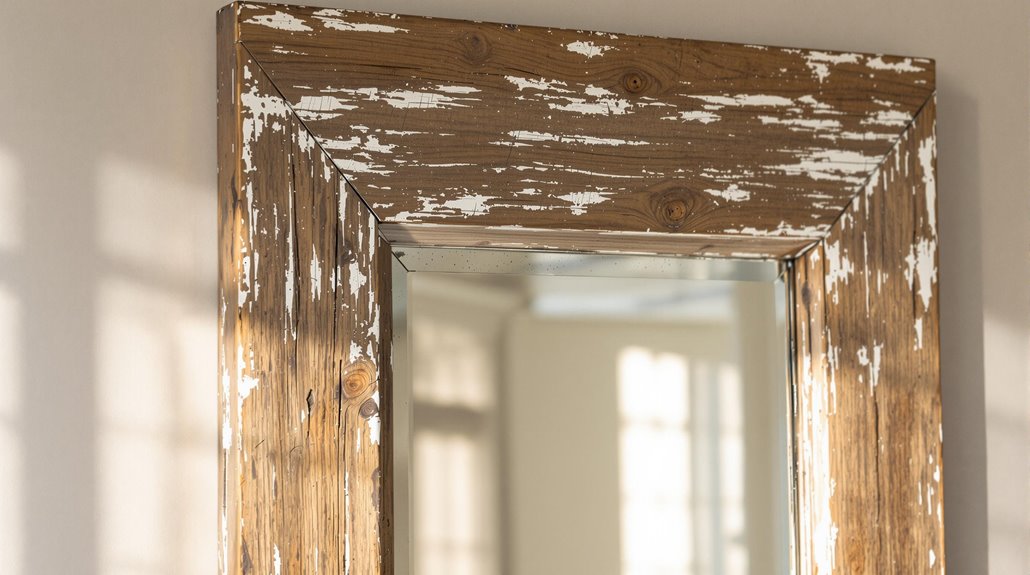
Moving from Victorian elegance to rustic simplicity, barn wood frames offer authentic charm with their weathered appearance and natural character. When creating your own rustic decor, look for reclaimed barn wood with interesting grain patterns and barn wood finishes. You can enhance the aged look by gently distressing the wood and applying a clear sealant to preserve its rustic beauty.
Copper Verdigris Technique
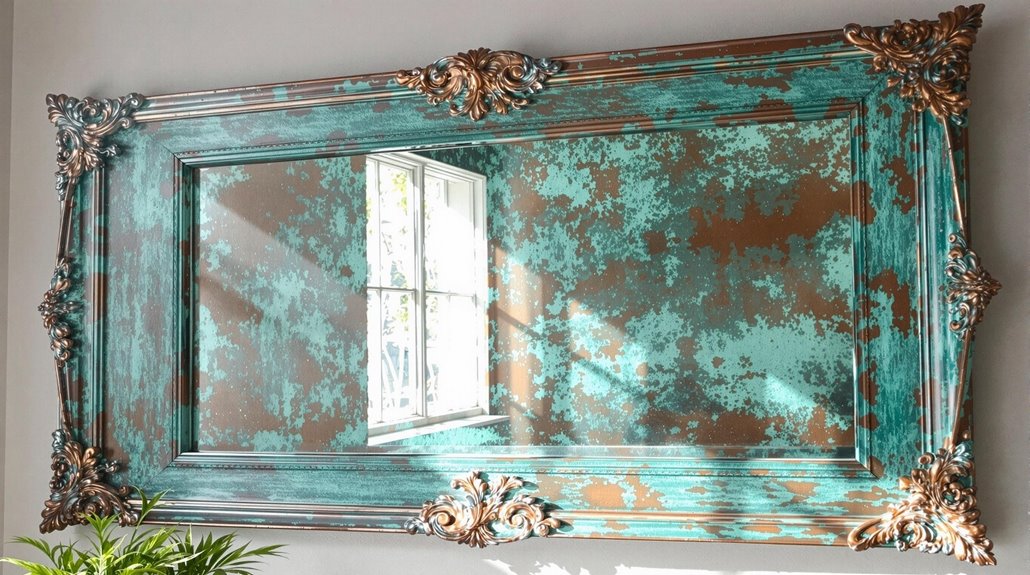
Creating a striking verdigris effect can transform plain mirror frames into stunning pieces that mimic ancient copper patinas. You'll love how easy it is to achieve this look using basic materials. Simply apply copper paint as your base, then create the signature copper oxidation by dabbing on a verdigris patina solution. Watch the magical transformation as your frame develops those beautiful blue-green tones.
Frequently Asked Questions
How Do I Protect My Antique Mirror Frame From Humidity Damage?
To protect your antique mirror frame from humidity damage, start by applying a quality protective coating like lacquer or varnish to seal the wood. Place silica gel packets near the frame to absorb excess moisture, and maintain consistent humidity control in your room using a dehumidifier. Keep the frame away from bathrooms and kitchens, and regularly dust with a soft cloth to prevent moisture buildup.
Can I Safely Clean an Antique Mirror Frame Without Damaging Decorative Elements?
When cleaning your antique mirror frame, use gentle cleaning techniques to protect decorative elements. Start with a soft microfiber cloth or brush to remove dust. For stubborn dirt, lightly dampen the cloth with distilled water, being careful not to oversaturate. Avoid harsh chemicals that could harm gilding or ornate details. Test any cleaning solution on a small, hidden area first for decorative preservation before treating the entire frame.
What Tools Are Essential for Hanging Heavy Antique Mirror Frames Securely?
For hanging heavy antique mirrors safely, you'll need sturdy wall anchors rated for the mirror's weight, heavy-duty hanging brackets, a stud finder, level, drill, screwdriver, measuring tape, and pencil. Don't forget safety gear like work gloves and protective eyewear. For extra security, consider D-rings and picture wire rated for double your mirror's weight, and always work with a helper to prevent accidents.
How Do I Fix Loose Corner Joints on an Old Mirror Frame?
To fix loose corner joints on an old frame, start by gently cleaning the joint area. Apply wood glue into the gap and clamp the corners together firmly. For extra frame reinforcement, insert L-brackets or metal corner braces on the back. You can also add small wooden blocks across corner joints for additional stability. Once dry, sand any excess glue and touch up the finish to match.
Should Antique Mirror Frames Be Stored Flat or Upright When Not Displayed?
Did you know that improper storage causes 35% of antique frame damage? When it comes to storage methods, storing your mirror frame upright is generally safer than laying it flat. Upright storage prevents uneven pressure on joints and reduces the risk of warping. However, make certain the frame is properly supported with padding and stored in a climate-controlled space for ideal frame stability. If storing flat, use even support across the entire surface.
